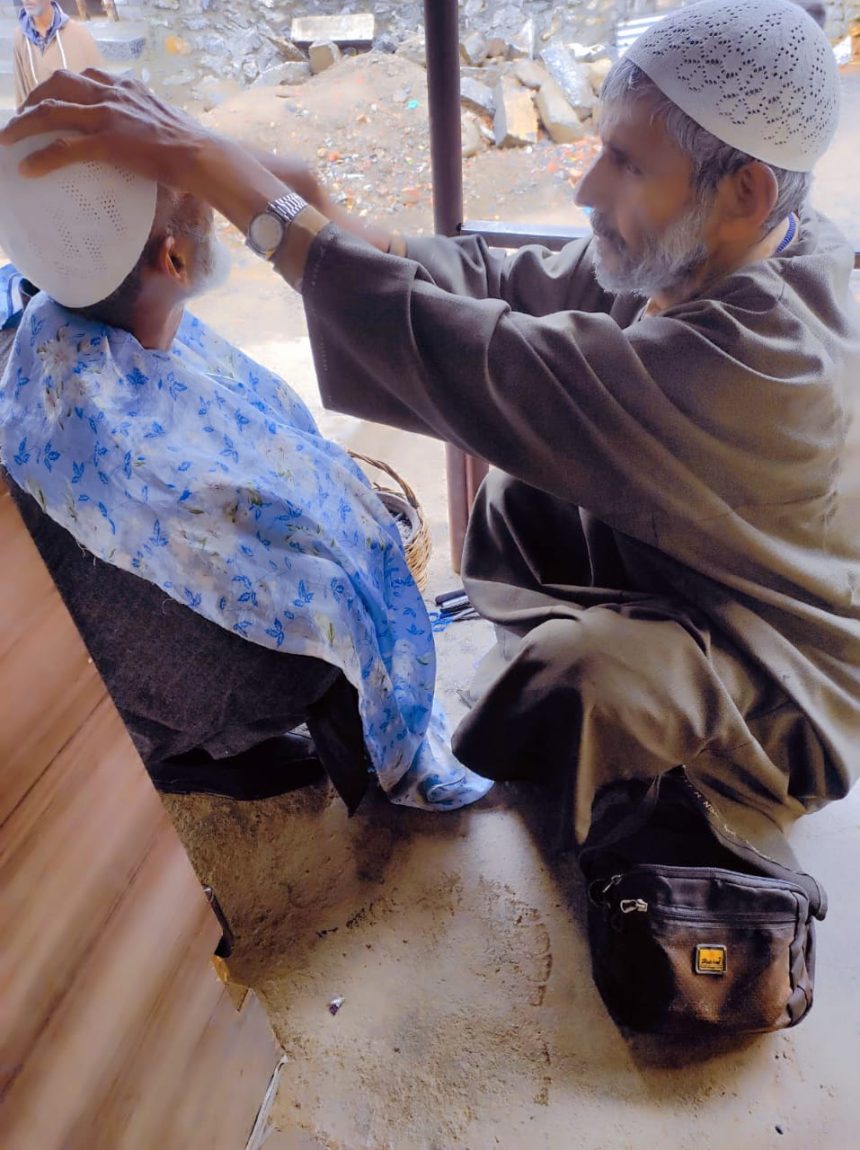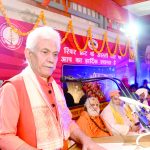In the bustling streets of Kashmir, where the aroma of traditional food fills the air and the sounds of daily life create a lively atmosphere, a once-thriving profession is quietly fading away. The street barbers, known locally as “tapre nayud,” are slowly disappearing.
For many years, street barbers have been a significant part of Kashmiri society. These barbers, mostly from the Hajam community, inherited their skills from their fathers and grandfathers. Despite being seen as a lower caste, the Hajam community took pride in their work, serving the people with dedication and skill.
Street barbers like Nazir Hajam and Muhammad Ismail have spent their lives setting up makeshift salons on the streets of Anantnag. With a rusty bicycle, a small mirror, and a few wooden chairs, they created a space where people could get a haircut or shave under the open sky. Their tools, neatly arranged in a tiny cupboard, were their most valuable possessions. Despite the stigma and ridicule they faced, these barbers continued their work with unwavering commitment.
Life as a street barber is not easy. They start their day early, setting up their makeshift salons and hoping for customers. But the challenges they face are many. The biggest challenge is the societal stigma attached to their profession. Being from the Hajam community, they are often looked down upon, and their services are considered old-fashioned. This societal bias has made it hard for them to attract customers.
In addition, street barbers have struggled to keep up with the changing times. Unlike modern salons, they don’t have the money to buy advanced tools and products. While modern barbershops offer the latest in shaving creams, head massagers, and trendy haircuts, street barbers rely on traditional methods and tools. This inability to modernize has made it harder for them to survive.
The rise of modern barbershops has transformed the grooming industry in Kashmir. These salons, with their advanced facilities and trained professionals, offer a wide range of services that cater to the changing preferences of customers. From stylish haircuts to luxurious shaves, modern barbershops provide an experience that street barbers cannot compete with.
One of the main reasons modern barbers are thriving is their ability to adapt to changing trends. They stay up-to-date with the latest hairstyles and grooming techniques, attracting younger customers who want modern styles. Additionally, modern barbershops maintain high standards of hygiene and comfort, which are important to today’s customers.
Economic factors have also played a big role in the decline of street barbers. The income from street barbering is often not enough to support a family. Many street barbers have had to find other ways to make a living, leaving behind their traditional craft. The lack of financial stability has made it difficult for them to keep their businesses going and compete with modern salons.
Furthermore, the arrival of non-local barbers in urban and suburban areas has added to the competition. These barbers, often more skilled and better equipped, have taken a significant share of the market, leaving street barbers struggling to survive.
Despite all these challenges, there are still a few street barbers who are trying to keep their craft alive. Ali Mohammad, an elderly street barber from Bandipora, continues to practice the traditional methods of haircutting and shaving. His dedication to preserving these old ways is a testament to the rich cultural heritage of Kashmir.
Ali Mohammad has been following this family profession for decades. He visits the homes of his long-time customers, carrying a bag filled with barbering essentials. He does this with great passion, even though it is not enough to cover his household expenses.
Ali Mohammad says that waking up early to go to work is not as exciting as it sounds. Many people avoid using his services because they are worried about how others will see them getting their hair cut on the side of the road. He feels that every street barber is a victim of stigma and ridicule because people look down on them because of their work.
Ali Mohammad also says, “Those whom we have been shaving and cutting hair for decades, and people from lower-income groups, still prefer us because we offer affordable prices.” He adds, “Whenever we offer someone a haircut or shave, they hesitate because they think our tools are not as clean and tidy as those in the local barbershops, which are more hygienic these days.”
Reflecting on the early days when the street barbering business was thriving, Ali Mohammad says that they were once the only source of hairdressing until local barbershops started appearing in the late eighties. He says that customers from all economic classes used their services and were very satisfied, but over time, several factors contributed to their decline.
Ali Mohammad says that street barbers have never been able to keep up with the times because they did not earn enough to afford modern methods of cutting and styling hair. He says that barbershops use modern tools and follow all the latest trends in hair cutting and styling, which has further reduced their customer base and limited them to serving only the lower segments of society.
The future of street barbers in Kashmir remains uncertain. Without support and recognition, this age-old profession may soon disappear. It is important for society to acknowledge the contributions of street barbers and provide them with the resources they need to sustain their craft.
The decline of street barbers in Kashmir is a sad reminder of how times are changing. As modern barbershops continue to dominate the grooming industry, traditional street barbers are left struggling with societal stigma, economic challenges, and their inability to modernize. Without support, their craft may soon vanish from the streets of Kashmir. It is important to preserve this cultural heritage and ensure that the legacy of street barbers lives on for future generations.
Adding to the difficulty of their situation, street barbers often lack access to financial aid or support from government programs that could help them modernize their businesses. Many of them are not aware of any such programs or lack the resources to apply for them. This further limits their ability to compete with modern barbershops.
The younger generation of the Hajam community is also reluctant to take up street barbering as a profession. Seeing the financial struggles and societal stigma faced by their elders, many young people are choosing to pursue other careers. This generational shift could lead to the complete disappearance of street barbers in the near future.








